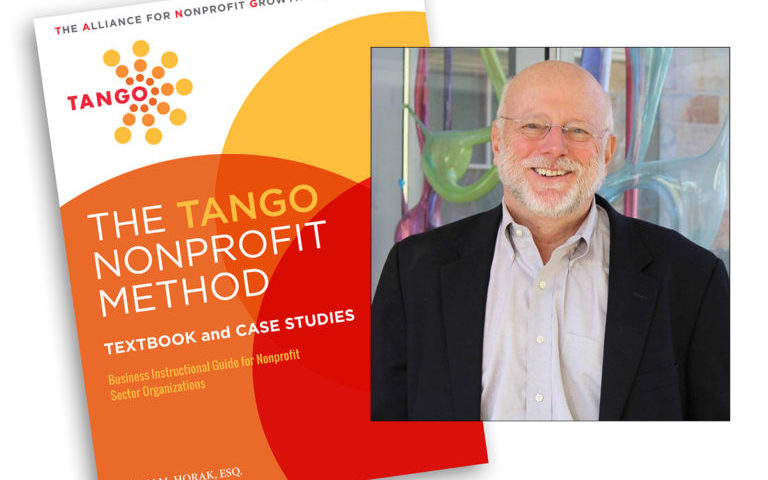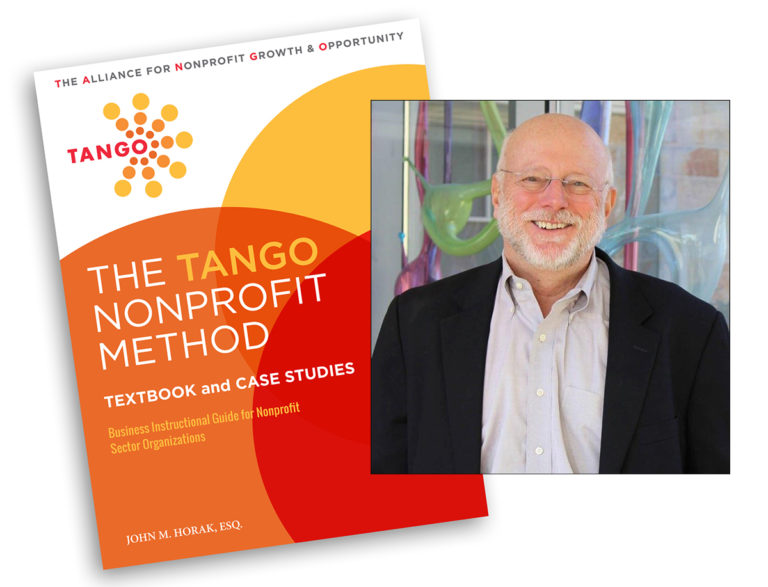4 Takeaways from the 2018 NIO Summit
October 11, 2018
The NANOE Declaration – We’re Calling for Revolution – Louis Fawcett
October 15, 2018Stop Calling Nonprofits Nonprofit – John Horak – The TANGO Alliance

John Horak, The TANGO Alliance – Those of us who work in the “nonprofit” sector need to stop using the term “nonprofit.” This may sound strange coming from someone who has made a living working for nonprofit organizations and who still uses the term regularly. Nevertheless, bear with me as I explain my reasoning. First, the term is an accident of legal history. At the end of the nineteenth and the beginning of the twentieth centuries the states started to enact general corporate law codes which allowed anyone to create a new corporation simply by filing paperwork with the office of the Secretary of State. Prior to the adoption of these statutes a person who wanted to form a corporation of any type had to have the legislature approve a statute (a Special Act) that gave birth to the entity.
The impetus for the general corporate law codes was the rapidly growing economy of the era. State legislators wanted to encourage economic growth by making it easier for people to start new business enterprises. The practice of referring to these enterprises as “for-profit” corporations made sense because they were created explicitly for the purpose of making money for their owners (shareholders).
Second, on a parallel historical track changes were afoot in the world of “charities.” Throughout history the common practice had been to organize charitable activities around the legal form of a charitable trust (an awkward form for operating entities). However, as the charitable sector expanded in size and operating breadth, people quickly realized that the corporate form was a better fit operationally, so it was carried over into common use in this sector as well. But these corporations would be organized to fulfill a mission of some type and not for the purpose of making a profit for owners because there are no owners. This is why nonprofit corporations do not have stockholders.
In other words, the term “nonprofit” developed as a convenient form of shorthand to distinguish the two types of corporation based on the purpose for which they exist (one’s purpose is to make profit for its shareholders and the other’s purpose is to operate a hospital, a homeless shelter, or whatever); but, and here’s the thing, the reference to “non-profit” has nothing to with the organizations financial results each year — making a financial profit (if they can) is what nonprofit organizations should do – and the noteworthy difference is that the financial profit must be reinvested back into the organization and its mission in some way.
Further to this point — the legal evolution discussed above began before the adoption of the Sixteenth Amendment to the Constitution (1913) which permitted Congress to enact a federal income tax, and while the income tax law always afforded an exemption for these organizations (giving rise to the synonymous term “tax-exempt”) the term “nonprofit” was already a part of the culture at the time and remains so to this day.
But, having read the above, one still may wonder if this accident of legal history justifies the effort it will take to find a substitute for the term “Nonprofit.” What harm does it do? I believe (as discussed above) that the term is misleading from a financial point of view – suggesting that somehow it is not lawful or proper for these organization to operate in the black each year — but even worse it has given rise to a “poverty is good” and “profit is bad” mentality that breeds bad practices (such as hostility to the business sector by far too many nonprofit leaders), and that actually undermines the ability of the organization to succeed precisely because success takes money.
If you do not find my point convincing, I urge you to go to the website of the National Association of Nonprofit Organizations & Executives (Based in Washington D.C.), and to watch BROKEN FOR GOOD: The Way Charity Works In The U.S. (Click here to view video). Broken for Good is a multi-year endeavor that is revealing the many structural problems that impede the ability of the sector to make the type of difference we expect of it, and it presents the “poverty culture” argument brilliantly and (to me) convincingly.
John Horak – Attorney/Director, The Alliance for Non-Profit Growth and Opportunity (TANGO) John Horak Esq. (Jack) joined TANGO on October 1, 2016 after a 36-year legal career at the Hartford office of the law firm Reid and Riege, P.C. Jack was a member of the firm’s Business Law Practice, where he created the firm’s Nonprofit Organization Practice Group. Jack was the principal author of the Reid and Riege Nonprofit Organization Report, a quarterly publication distributed throughout the United States; and also regularly published articles and editorials on legal and policy issues in Philanthropy Magazine, the Hartford Courant the Connecticut Law Tribune, and the Hartford Business Journal where he writes a regular editorial column entitled “Rule of Law.”

John Horak
Director TANGO Nonprofit Education and Consulting
The Alliance for Nonprofit Growth & Opportunity (TANGO)
www.tangoalliance.org
135 South Road
Farmington, CT 06032
Phone: 877-70-TANGO
Direct Dial: 860-507-8902
John Horak Contact Information:
Cell: 860-463-7130
Email: [email protected]
The post Stop Calling Nonprofits Nonprofit – John Horak – The TANGO Alliance appeared first on 501c3.buzz.
